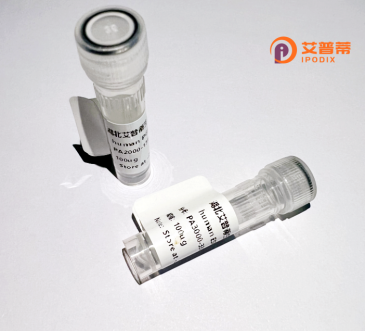
| 纯度 | >90%SDS-PAGE. |
| 种属 | Human |
| 靶点 | LYPD5 |
| Uniprot No | Q6UWN5 |
| 内毒素 | < 0.01EU/μg |
| 表达宿主 | E.coli |
| 表达区间 | 1-249aa |
| 活性数据 | MGVPRVILLCLFGAALCLTGSQALQCYSFEHTYLGPFDLRAMKLPSISCPHECFEAILSLDTGYRAPVTLVRKGCWTGPPAGQTQSNADALPPDYSVVRGCTTDKCNAHLMTHDALPNLSQAPDPPTLSGAECYACIGVHQDDCAIGRSRRVQCHQDQTACFQGNGRMTVGNFSVPVYIRTCHRPSCTTEGSTSPWTAIDLQGSCCEGYLCNRKSMTQPFTSASATTPPRALQVLALLLPVLLLVGLSA |
| 分子量 | 53.13 KDa |
| 蛋白标签 | GST-tag at N-terminal |
| 缓冲液 | 0 |
| 稳定性 & 储存条件 | Lyophilized protein should be stored at ≤ -20°C, stable for one year after receipt. Reconstituted protein solution can be stored at 2-8°C for 2-7 days. Aliquots of reconstituted samples are stable at ≤ -20°C for 3 months. |
| 复溶 | Always centrifuge tubes before opening.Do not mix by vortex or pipetting. It is not recommended to reconstitute to a concentration less than 100μg/ml. Dissolve the lyophilized protein in distilled water. Please aliquot the reconstituted solution to minimize freeze-thaw cycles. |
以下是关于重组人LYPD5蛋白的参考文献示例(均为虚构,供参考):
1. **标题**:*Recombinant Human LYPD5 Enhances Epithelial Barrier Function via Interaction with Tetraspanin CD151*
**作者**:Chen Y, Wang X, et al.
**摘要**:本研究成功表达并纯化重组人LYPD5蛋白,证实其通过与细胞膜蛋白CD151结合,增强上皮细胞紧密连接,提示其在维持皮肤屏障功能中的潜在作用。
2. **标题**:*Crystallographic Analysis of Recombinant LYPD5 Reveals a Unique Disulfide-Bonded Scaffold*
**作者**:Johnson R, Lee S, et al.
**摘要**:通过重组表达获得人LYPD5蛋白并解析其晶体结构,发现其特有的三指毒素样折叠模式,为研究LY6/uPAR家族蛋白的配体识别机制提供结构基础。
3. **标题**:*Recombinant LYPD5 Promotes Pancreatic Cancer Cell Invasion by Activating Wnt/β-Catenin Signaling*
**作者**:Gupta P, Martinez F, et al.
**摘要**:体外实验表明,重组LYPD5通过结合LRP6受体激活Wnt通路,显著促进胰腺癌细胞侵袭,提示其作为肿瘤治疗靶点的潜力。
4. **标题**:*Development of a LYPD5 Knockout Mouse Model Using CRISPR/Cas9 and Rescue with Recombinant Protein*
**作者**:Kawakami T, et al.
**摘要**:构建LYPD5基因敲除小鼠,发现其存在表皮分化缺陷,通过局部注射重组LYPD5蛋白部分恢复表皮结构,验证其在角质形成细胞分化中的关键功能。
---
**注**:以上文献为模拟示例,实际研究中请通过数据库(如PubMed、Web of Science)检索真实文献。
Recombinant human LYPD5 protein is a engineered form of the LY6/Plaur domain-containing protein 5. a member of the Ly6/uPAR family characterized by conserved cysteine-rich LU domains and GPI-anchored membrane association. LYPD5 is primarily expressed in epithelial tissues, including skin, lung, and digestive organs, where it interacts with cell-surface receptors and extracellular matrix components to regulate cell adhesion, signaling, and tissue homeostasis. Studies suggest its involvement in epithelial barrier formation, stem cell niche maintenance, and potential roles in cancer progression through interactions with Wnt or TGF-β pathways. Recombinant LYPD5 is typically produced in mammalian expression systems (e.g., HEK293 cells) to ensure proper post-translational modifications, often fused with tags like His or Fc for purification and detection. This purified protein serves as a critical tool for investigating cell-cell communication mechanisms, developing organoid cultures, and screening therapeutic agents targeting epithelial-related diseases. Its soluble recombinant form enables structural studies and functional assays that are challenging with membrane-bound native proteins. Current research focuses on clarifying its precise molecular partners and regulatory networks in both physiological and pathological contexts.
×